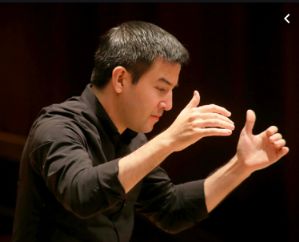|
Symphony
FROM THE NEW WORLD TO THE OLD WORLD
by Peter Lert
Saturday, June 14, 2025
Chamber
MC2 DUO RECITAL CLOSES 222'S SEASON
by Terry McNeill
Saturday, June 14, 2025
Choral and Vocal
CANTIAMO SONOMA'S LUSCIOUS A CAPELLA SINGING IN SEASON ENDING CONCERT
by Pamela Hicks Gailey
Sunday, June 8, 2025
Symphony
SRS SEASON ENDS WITH RESOUNDING TA-TA-TA-BANG
by Terry McNeill
Sunday, June 1, 2025
Symphony
YOUTHFUL VIRTUOSITY ON DISPLAY AT USO'S MAY CONCERTS
by Peter Lert
Saturday, May 17, 2025
Symphony
MYSTICAL PLANETS AND LIVELY GERSHWIN ORTIZ AT FINAL SRS CONCERT
by Peter Lert
Sunday, May 4, 2025
Symphony
VSO'S CONCERT MUSIC OF TIME, MUSIC OF PLACE
by Peter Lert
Sunday, April 27, 2025
VOCAL ELEGANCE AND FIRE AT THE 222'S RECITAL APRIL 26
by Pamela Hicks Gailey
Saturday, April 26, 2025
CANTIAMO SONOMA SINGS AN INSPIRED GOOD FRIDAY MOZART REQUIEM CONCERT
by Pamela Hicks Gailey
Friday, April 18, 2025
DRAMATIC SHOSTAKOVICH SYMPHONY CLOSES PHILHARMONIC'S 25TH SEASON
by Terry McNeill
Sunday, April 13, 2025
|
 |
 Conductor Francesco Lecce-Chong |
ORCHESTRAL VIRTUOSITY IN SR SYMPHONY'S 92ND SEASON OPENER
by Terry McNeill
Monday, October 7, 2019
Season-beginning orchestra concerts usually feature a splashy mix of overture/fanfare, a sonorous symphony and a virtuosic concerto. Santa Rosa Symphony’s Oct. 6 opener in Weill Hall had a contrary design with two new works and a Richard Strauss symphonic showpiece tone poem. Sunday’s afternoon’s concert in the set of three is reviewed here.
Somehow a Beethoven Concerto slipped into the mix, with San Francisco based virtuoso pianist Garrick Ohlsson the soloist with resident conductor Francesco Lecce-Chong on the podium. Mr. Ohlsson’s chaste opening phrase in the G Major (Op. 58) Concerto led to an ethereal orchestral start and judicious tempos throughout the allegro moderato. Everything was in balance and themes were limpid and clear to my balcony seat. Several years ago in recital Mr. Olhsson played with the largest piano sonority I have yet heard in Weill, with Liszt’s great “Weinen, Klagen” Variations. Horowitz and Hofmann sonority. But this afternoon he aimed at a refined and balanced interpretation, occasionally surprisingly breaking a chord but eschewing inner voices or harmonic pointing.
In the midst of genteel orchestral support the pianist displayed in the first movement many examples of his stellar art with expressive trills and deft control of pianissimo, but also much that was conventional. Outside of routine, Mr. Ohlsson’s pedal technique missed the opportunity for resonance (full pedal) and taking advantage of the potent orchestral tutti before restating the opening theme fortissimo in the middle of the movement, but he did hold the pedal through the final three chords, a nod perhaps to virtuoso tradition.
Playing in the andante was elegant throughout with deft pauses in the unfolding soft drama, leading inexorably to a lively rondo with Mr. Lecce-Chong in steady control. Again Mr. Ohlsson took a restrained interpretative approach, but it’s that kind of piece with ample subdued drama. He played the Beethoven cadenzas in the first and third movements, the latter with marching left-hand phrases and much half pedal. Though dozens of innovative cadenza alternatives exist, the composer’s own seem alas to be the rule these days.
There was a standing ovation, followed by a lengthy intermission, and the second half began with composer-in-residence Matt Browne’s How The Solar System Was Won. Lasting just eight minutes the work is steeped in contrasts, opening with an eerie shimmering voice in the strings and moving to expertly played instrumental solos from the flute, piccolo, brass brilliance (three each trumpets and trombones), Andrew Lewis’ tympani and distinct wood block and xylophone sound from three percussionists. There is some cacophony in this music, leavened by lyrical playing from the first violin section.
The composer made charming explanatory remarks from the stage prior to the tour de force performance, and appeared at the end to loud applause.
Over 60 musicians were on stage for the concert’s finale, Strauss’ 1896 Also Sprach Zarathustra tone poem. The famous brass and organ opening was suitably powerful, and the conductor perfectly shaped the sound and the eight subsequent parts that are at times meandering but also replete with splendid individual playing. Some of the highlights were John Freeman’s trumpet work, chirpy flute and piccolo playing and rich sound from Andy Butler’s five contrabass musicians.
The performance was packed with imposing juxtapositions – long sections of lugubrious sensuality and then explosive outpourings of sound, even in the short fugue that had accelerated speed. Clarity of texture came with Mr. Lecce-Chong’s attention to section detail, to the point that even the two harp, tuba and organ parts were lucid.
This work demands impeccable playing from the first violins, and it was so in this performance, reminiscent of the Strauss Ein Heldenleben on the Weill stage three years ago from the Mariinsky Orchestra and conductor Valery Gergiev. The concertmaster then played like an angel in the many solos, and his counterpart here, Joseph Edelberg and his exemplary violin colleagues, did likewise, often in fetching lyricism over the flutes and clarinets.
The audience of nearly 1,300 clapped vigorously, and the Mr. Lecce-Chong motioned for many of his musicians to stand to acknowledge the applause.
The concert began with Anna Clyne’s Masquerade, a short piece with obligatory noisy percussion effects and hoary banal melodies, and passed with little notice.
|

